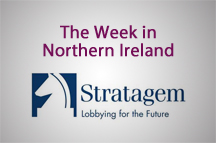 The candidate nomination papers are in, electoral posters are up, and, well, most of the political parties’ manifestos are out. With just two weeks to go until the Northern Ireland Assembly election, 276 candidates on ballot papers across eighteen constituencies and 108 seats available, nothing can be taken for granted.
The candidate nomination papers are in, electoral posters are up, and, well, most of the political parties’ manifestos are out. With just two weeks to go until the Northern Ireland Assembly election, 276 candidates on ballot papers across eighteen constituencies and 108 seats available, nothing can be taken for granted.
This year’s outgoing Assembly looked very different to the cohort that was initially elected in 2011. Indeed, around one third of the MLAs who stood for election five years ago have either stood down, subsequently replaced by party colleagues, or recently retired following the Assembly’s dissolution. The last mandate was not without its ups and downs before parties agreed to make a ‘Fresh Start’ in December 2015.
The DUP was the first of the parties to release its election manifesto, calling upon voters to back new leader Arlene Foster for First Minister and her plan for keeping ‘Northern Ireland moving forward’. The SDLP also with a new leader in Colum Eastwood, which bemoaned the “illusion of progress”.
The Ulster Unionist Party has pledged to make Stormont work, yet having quit the Executive altogether in August 2015 time will tell whether they will aim to do this from within or outside government.
This week the Alliance Party also launched its ‘5 quick steps’ manifesto. This was followed by the Green Party’s release of a ‘Zero Waste Strategy’ manifesto. Earlier in the campaign UKIP called on the electorate to ‘believe in Northern Ireland’, whilst true to form the Traditional Unionist Party promised ‘straight talking principled politics’
 The last of the manifesto launches will come next week when Sinn Féin unveils its policies in the Foyle constituency, an area where the party has long targeted a third seat at the expense of the SDLP. The surprise candidature of Deputy First Minister Martin McGuinness this time around (having until recently represented Mid Ulster), against rival Mr Eastwood, makes this nationalist battle one of the must-watch contests of the election.
The last of the manifesto launches will come next week when Sinn Féin unveils its policies in the Foyle constituency, an area where the party has long targeted a third seat at the expense of the SDLP. The surprise candidature of Deputy First Minister Martin McGuinness this time around (having until recently represented Mid Ulster), against rival Mr Eastwood, makes this nationalist battle one of the must-watch contests of the election.
Soon after Election Day on 5th May, attentions will turn to the process of forming a new Programme for Government (PfG). We expect to see a lot of new faces in the Assembly tasked with taking forward business in the new mandate; a reduction in the number of departments from twelve to nine will also come into effect. This will be reflected in a similar reduction in Ministers represented in the new Executive. By the next mandate scheduled to begin in 2021, we can expect the number of MLAs to fall from 108 to 90.
Which government departments the parties select under the d’Hondt power-sharing system will undoubtedly impact the legislative landscape. However, what we can expect from the new Executive is an outcomes-based PfG which promises to offer a markedly different approach. With a similar model having operated in Scotland over the last mandate, how Northern Ireland politicians negotiate and implement the next PfG will provide an interesting case for comparison.












